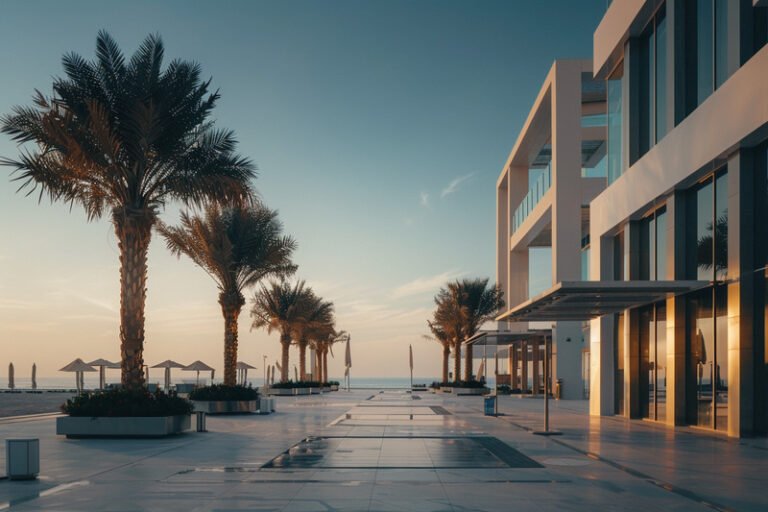Detailed Explanation of Mortgage Terms and Conditions

Navigating the Dubai real estate market involves understanding unique mortgage terms and conditions. From Islamic finance options to expatriate-specific requirements, the landscape can be complex.
Whether you're eyeing a luxury apartment in Downtown Dubai or a villa in Palm Jumeirah, grasping these financial intricacies is crucial.
Interest rates, loan types, and down payments in Dubai have their own nuances. The market offers both conventional and Sharia-compliant mortgages, each with distinct features. Expatriates face additional considerations, including visa status and income requirements.
Understanding Dubai's property laws and regulations is essential. These include land ownership restrictions, off-plan purchase terms, and service charges. Familiarizing yourself with these aspects can significantly impact your investment decision.
Let us help you find the perfect property. Contact us to get started.
Closing costs in Dubai differ from other markets. They include transfer fees, mortgage registration fees, and valuation charges. Being aware of these expenses helps in budgeting accurately for your property purchase.
Dubai's real estate market offers unique investment opportunities, but also comes with specific challenges. By delving into the details of mortgage terms and conditions, you can navigate this market more effectively and make informed decisions.
Key Takeaways
Dubai's real estate market offers unique mortgage options tailored to its diverse population. Understanding these terms is crucial for both local and international investors. Mortgages in Dubai come with specific conditions, reflecting the emirate's dynamic property landscape and regulatory environment. From loan durations to down payment requirements, each aspect is designed to balance market stability with investor accessibility. This guide explores key mortgage terms and conditions in Dubai, providing essential insights for prospective property buyers and investors in the emirate.
Mortgage terms in Dubai typically span 15 to 25 years. Banks offer both fixed-rate and adjustable-rate options, allowing borrowers to choose based on their financial strategy and risk tolerance. Fixed rates provide stability, while adjustable rates may offer lower initial payments but carry potential for future increases.
Loan-to-value (LTV) ratios are critical in determining borrowing capacity. UAE nationals must provide a minimum 20% down payment, while expatriates require at least 25%. These requirements ensure borrowers have a significant stake in the property and help maintain market stability.
Amortization schedules detail how mortgage payments are allocated over time. Initially, a larger portion goes towards interest, gradually shifting to principal as the loan matures. This structure allows for decreasing interest payments and increasing equity buildup over the mortgage term.
Escrow accounts, regulated by Law No. 8 of 2007, play a vital role in Dubai property transactions. These accounts secure funds between buyers and sellers, ensuring transparency and protection for all parties involved in the real estate deal.
Insurance is a key component of Dubai mortgages. Property insurance is mandatory, protecting the asset against damage or loss. Life insurance, often called mortgage protection, is also common, ensuring loan repayment in the event of the borrower's death.
Interest Rates Explained
In Dubai's dynamic real estate market, understanding interest rates is crucial for property buyers and investors. The emirate offers both conventional and Islamic financing options, each with unique interest rate structures. Fixed rates provide stability, while adjustable rates offer potential savings but come with more risk.
Your credit score significantly influences the interest rate you'll receive from Dubai banks. A higher score often leads to more favorable terms. Even small differences in rates can substantially impact your long-term costs, especially given the high property values in Dubai's premium locations.
When comparing mortgage offers in Dubai, pay attention to both the interest rate and the annual percentage rate (APR). The APR includes additional fees, providing a more comprehensive view of your loan's cost. This is particularly important in Dubai's competitive property market, where fees can vary widely between lenders.
Dubai's real estate landscape is influenced by global economic factors, local regulations, and market trends. Stay informed about these elements to make wise property investment decisions and secure the most advantageous interest rates for your Dubai real estate purchase.
Loan Types and Terms
Dubai's real estate market offers diverse mortgage options for prospective homebuyers. Two main types dominate: conventional and Islamic loans. Conventional loans follow traditional banking practices, while Islamic loans adhere to Sharia principles. Within these categories, fixed-rate and adjustable-rate mortgages are available.
Fixed-rate loans provide stable monthly payments, while adjustable-rate mortgages may fluctuate with market conditions. Loan terms in Dubai typically range from 15 to 25 years, with some lenders extending up to 30 years.
The loan-to-value (LTV) ratio is crucial, determining borrowing capacity based on property value. UAE Central Bank caps LTV ratios at 80% for expatriates and 85% for UAE nationals on properties under AED 5 million. Higher-value properties have slightly lower ratios.
Additional fees, such as processing fees and early settlement charges, can impact the overall mortgage cost. Understanding these terms and their financial implications is essential for Dubai homebuyers.
Down Payments and PMI
Down payments are crucial in Dubai's property market, influencing borrowing capacity and loan terms. Minimum requirements are typically 20% for UAE nationals and 25% for expatriates, though these can vary. Larger down payments lead to lower loan-to-value ratios, often resulting in better interest rates and terms. The amount you put down impacts your overall financial commitment and can affect your eligibility for certain properties in Dubai's competitive real estate landscape.
In Dubai, if your down payment is less than 20%, you may need to pay for Mortgage Default Insurance (MDI). This protects the lender if you default on your loan. MDI costs are usually added to your monthly mortgage payment, increasing your overall expenses.
Once you've built up 20% equity in your Dubai property, you can request to have MDI removed. It's important to consider the long-term costs of MDI when deciding on your down payment amount.
Saving for a larger down payment in Dubai can potentially help you avoid MDI altogether. This strategy can reduce your monthly mortgage costs and save you money over the life of your loan, making your Dubai property investment more cost-effective in the long run.
Amortization Schedules
In Dubai's dynamic real estate market, understanding amortization schedules is crucial for property investors and homeowners. These schedules break down mortgage payments over time, showing how much goes toward principal and interest. Initially, a larger portion of payments covers interest due to the high outstanding balance at the loan's start.
As payments continue, the allocation gradually shifts. More funds go toward the principal, less toward interest. This process, called amortization, ensures loan repayment by the end of its term. In Dubai's property market, where investment opportunities abound, these schedules help track progress and plan future investments.
Amortization schedules are particularly useful in Dubai for understanding equity buildup in properties. They also help investors determine when they might eliminate mortgage insurance if required. For budgeting in Dubai's luxury real estate market, these schedules provide a clear picture of long-term financial commitments.
In Dubai's fast-paced property scene, amortization schedules offer valuable insights. They help investors make informed decisions about property purchases, refinancing options, and potential returns on investment. This tool is essential for navigating Dubai's unique real estate landscape effectively.
Escrow Accounts Demystified
Escrow accounts are a crucial component of Dubai's real estate transactions, providing a secure intermediary for funds between buyers and sellers. When purchasing property in Dubai, you'll likely encounter this term during the process. This financial arrangement protects both parties involved in the transaction, ensuring a smooth and secure exchange of property and funds.
In Dubai, escrow accounts are managed by banks or licensed escrow agents approved by the Dubai Land Department. When making an offer on a property, you'll deposit your earnest money into this account, demonstrating your commitment to the purchase and providing security for the seller.
As the transaction progresses, additional funds, such as your down payment and closing costs, will be held in escrow. The escrow agent ensures all conditions of the sale are met before releasing the funds to the seller.
This includes verifying that the property title is clear, all necessary inspections are completed, and all required documents are signed. Once everything is in order, the escrow agent will disburse the funds and transfer the property title to you, the buyer.
In Dubai, the use of escrow accounts is regulated by Law No. 8 of 2007, which aims to protect buyers' interests and promote transparency in real estate transactions. This law requires developers to open escrow accounts for off-plan property sales.
Prepayment Penalties
In Dubai's real estate market, prepayment penalties are a crucial consideration for mortgage borrowers. These fees, imposed by lenders when borrowers repay their loans earlier than agreed, compensate for lost interest. The penalties vary significantly among Dubai lenders and loan types, ranging from none to a percentage of the outstanding balance or a fixed fee.
Understanding your loan agreement's specific terms is essential, as penalties typically decrease over time and may eventually disappear. Carefully weigh the potential savings of early repayment against the penalty cost.
For those planning to sell or refinance soon, choosing a mortgage with lower or no prepayment penalties could be advantageous. Always discuss these terms with your lender before finalizing any agreement.
In Dubai, the benefits of early repayment should be balanced against potential penalties. Consult with financial advisors to determine the most cost-effective strategy for your specific situation.
Closing Costs Breakdown
Understanding closing costs is crucial for Dubai homebuyers. These expenses accompany your down payment and include several components.
Property registration fees, charged by the Dubai Land Department, typically amount to 4% of the property's value. Developer transfer fees range from 2% to 4% of the purchase price.
Lenders charge mortgage registration fees, valuation fees, and processing fees. Real estate agent commissions usually cost around 2% of the property's value. Legal fees for document review and property insurance are additional expenses to consider.
Some fees may be negotiable, while others are fixed by government regulations.
To avoid surprises, request a detailed breakdown of all closing costs from your lender and real estate agent early in the process. This helps you budget accurately and prepare for the financial commitments of your Dubai property purchase.
Mortgage Insurance Options
Mortgage insurance in Dubai offers unique protections for lenders and borrowers. Two main types are available: property insurance and life insurance. Property insurance is mandatory, covering your home against damages from fire, natural disasters, and other unforeseen events. It's typically bundled with your mortgage and paid as part of your monthly installments.
Life insurance, often called 'mortgage protection insurance' in Dubai, is strongly recommended. It guarantees mortgage repayment if the borrower passes away, safeguarding families from financial burden. Some lenders may require it, especially for larger loans.
Borrowers can choose between decreasing term insurance, where coverage reduces as the mortgage balance decreases, or level term insurance, which maintains a constant coverage amount throughout the loan term.
It's crucial to carefully review the terms and conditions of these insurance options, as they can significantly impact overall mortgage costs.
Consulting with a financial advisor can help determine the best insurance strategy for specific situations and mortgage terms in Dubai's real estate market.
Refinancing Considerations
Refinancing a mortgage in Dubai can offer homeowners the opportunity to secure better interest rates or access equity in their property. When considering this option, it's crucial to evaluate several factors carefully. Your current financial situation, including credit score, income stability, and debt-to-income ratio, will play a significant role in determining eligibility.
Researching current market rates and comparing them to your existing mortgage is essential. Calculate potential savings, factoring in refinancing fees. Consider your long-term plans for the property and assess its current value.
Dubai's real estate market has unique characteristics that affect refinancing decisions. The city's property values can fluctuate rapidly, impacting loan-to-value ratios. Familiarize yourself with local regulations governing mortgage refinancing, as they may differ from other markets.
If you're contemplating cash-out refinancing to access equity, weigh the advantages against the increased debt load. Dubai's property market offers various refinancing options, so explore multiple lenders to find the best terms.
Consult with a financial advisor experienced in Dubai's real estate sector. They can provide valuable insights into the local market and help you make an informed decision based on your specific circumstances and goals.
Default and Foreclosure Processes
In Dubai's real estate market, defaulting on a mortgage can lead to foreclosure. The process begins when payments are missed, prompting lenders to issue a notice of default. This gives borrowers a specified period to rectify the situation. If the account isn't brought current, foreclosure proceedings may commence.
Foreclosures in Dubai are governed by Law No. 14 of 2008. The process typically starts with the lender filing a case with the Dubai Land Department. The property owner receives formal notification, and the property is registered as 'under foreclosure.'
A grace period often follows, allowing for negotiation or debt settlement. If unresolved, the property may be auctioned to recover the outstanding amount. Foreclosure has severe consequences, including property loss and negative impact on credit scores.
Early communication with lenders is crucial when facing financial difficulties. Lenders may offer alternatives like loan modification or repayment plans to help avoid foreclosure. These options can provide a lifeline for struggling property owners in Dubai's real estate market.
Conclusion
Navigating the Dubai real estate market requires a thorough understanding of mortgage terms and conditions. In this vibrant emirate, property financing comes with unique considerations. Prospective buyers must familiarize themselves with local interest rates, Islamic finance options, and conventional mortgages. Down payment requirements, which can be higher than in other markets, play a crucial role in property acquisition.
Dubai's property market offers various loan types, including fixed-rate and adjustable-rate mortgages. Buyers should carefully examine amortization schedules and consider the impact on their long-term financial planning. Understanding the intricacies of Dubai's property laws and regulations is essential for a smooth transaction.
Escrow accounts are commonly used in Dubai real estate transactions to ensure secure fund transfers. Buyers should be prepared for closing costs, which may include registration fees and mortgage processing charges. Some lenders may require mortgage insurance, adding to the overall cost of homeownership.
Refinancing options exist in Dubai, but terms may differ from other markets. Buyers should be aware of the potential consequences of default, including legal implications specific to the UAE. Familiarizing oneself with these aspects is crucial for making informed decisions in Dubai's dynamic real estate landscape.
Let us help you find the perfect property. Contact us to get started.






